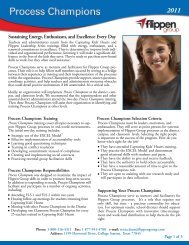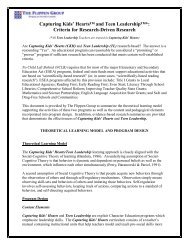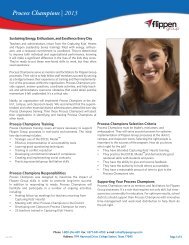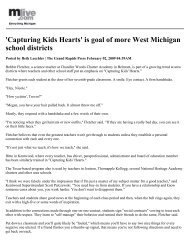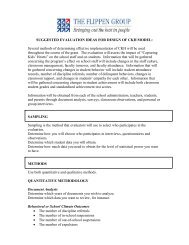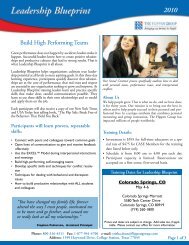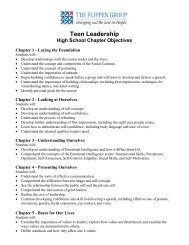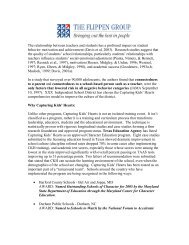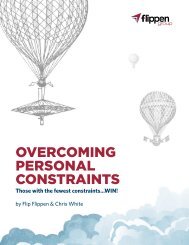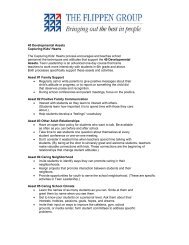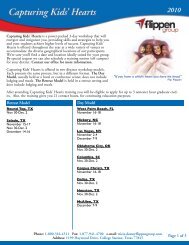Smart & Good High Schools - The Flippen Group
Smart & Good High Schools - The Flippen Group
Smart & Good High Schools - The Flippen Group
- No tags were found...
Create successful ePaper yourself
Turn your PDF publications into a flip-book with our unique Google optimized e-Paper software.
<strong>Smart</strong> & <strong>Good</strong> <strong>High</strong> <strong>Schools</strong>CHAPTER 5: Fostering the 8 Strengths of Character—Outcome 5because being mediated by peers holds a huge power in thelife of an adolescent.“Discipline by a peer-run JusticeCommittee has a huge impacton an adolescent.”Involving students in the disciplinary process also has thebenefit of fostering the ethic of collective responsibility—a vital part of moral agency and one of the essential ingredientsof an ethical learning community.A System of Earned PrivilegesOne large high school we visited made effective use of asystem of earned privileges as a way to promote respectfuland responsible behavior. A boy there said:Because we have to earn privileges, such as parking on campus,it means more to us when we have them. It causes studentsto take more responsibility for their actions. I foundthis to be the biggest difference between my high schooland other high schools I visited. Those schools often feltmore like jails than schools. Give students the opportunityto perform morally and see what they can do.<strong>The</strong> Quality of Our RelationshipsFinally, with discipline, as with all aspects of teaching, wedo well to remember the foundational importance of therelationship between the adult and the student. Said oneteacher:“Tell me your dreams, and I’ll helpyou realize them.”Your leverage in disciplining comes from the quality of yourrelationship. If kids know you care about them, it makes ahuge difference. <strong>The</strong> most valuable thing I learned aboutdiscipline came from my principal when I taught juniorhigh. He would say to students, “I’m here to help you realizeyour dreams. Tell me what your dreams are, and I’ll helpyou realize them.” That’s the most powerful thing I’ve everheard anyone say to kids, in school or in the workplace.OUTCOME 5:Respectful and Responsible Moral AgentPromising Practice 3:Use the academic curriculum todevelop moral agency.5 How can the academic curriculum be usedto develop moral agency, in particular moral courage andthe sense of responsibility to intervene in the face ofinjustice? Facing History and Ourselves (www.facing.org) isan example of an academic curriculum that develops thisaspect of moral agency. Facing History is one of the 32 programsidentified as having research validation by thereport What Works in Character Education. 133Used at the middle and high school levels, Facing Historyis an 8-week unit that examines the Nazi Holocaust, theTurkish persecution of the Armenians, and other largescaleviolations of human rights. Students view films;engage in class discussions; hear guest speakers, includingsurvivors of the Holocaust, the Armenian persecution, orthe Cambodian genocide; examine historical documents;and discuss readings that address issues of power, morality,justice, and caring for others.In studying the Holocaust, for example, students investigatequestions such as:◆ How did individuals decide to support or oppose theNazi regime?◆ What were the motivations of those who decided tohelp the persecuted minorities and of those whoremained silent?◆ How did leaders of foreign nations respond to reportsof Nazi persecution of minorities?In Andrew Garrod’s edited collection of essays, Learningfor Life: Moral Education <strong>The</strong>ory and Practice, Margot SternStrom, Martin Sleeper, and Mary Johnson explain thevision of history that inspires the Facing History curriculum:Facing History has revived the time-honored tradition ofhistory as a moral science, which goes back to antiquity andWe acquire the virtues by exercising them. It is by doing just acts that we becomejust, by performing acts of self-control that we become temperate, and by doingcourageous acts that we become courageous.—ARISTOTLE



